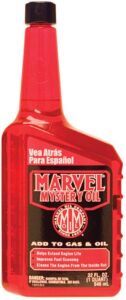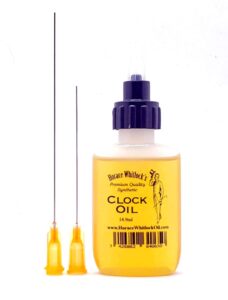Only well-maintained sewing machines give their owners many happy years of service. Lubricating its parts is one of the most significant steps of this maintenance.
Oiling a sewing machine periodically ensures that the moving parts run smoothly by keeping wear and tear from friction and rust at bay. So if you are new to sewing and notice some unusual behavior from your sewing machine, it might just be thirsty.
The type of oil used to oil sewing machines is, of course, sewing machine oil. It is an oil specially formulated precisely for sewing machines. However, sometimes sewing machine oil is not accessible when you need it most. And if you’ve read this far, chances are you are facing a similar predicament and looking for alternative oils.
So, what are the best substitutes for sewing machine oil? A few of the best sewing machine oil substitutes are tri-flow oil, clipper oil, Marvel Mystery Oil, white mineral oil, and clock oil. These oils will do the job, but it’s best to stick with sewing machine oil.
Well, don’t get worked up over it. In this post, we uncover the 5 best substitutes for sewing oil so you can complete that project on time without harming your machine.
What Is Sewing Machine Oil?
Oils vary in color, odor, viscosity, and composition. To find the best alternative for sewing machine oil, you must have an idea of what it is to get the closest match.
Sewing machine oil is a transparent oil with no smell designed for lubricating moving parts of a sewing machine. Its viscosity can be described as light hence evaporates without leaving residue.
Although its exact composition is usually not indicated to keep brand formula secret, sewing machine oil is mostly purified mineral oil.
It is the best oil for lubricating sewing machines. Actually, the only recommended oil if you ask your sewing machine manufacturer and technicians.
Do You Need To Oil A Sewing Machine?
Yes, you do. After churning many yards of clothing, the sewing machine’s moving parts like gears usually need to be oiled to continue functioning correctly.
The frequency of oiling depends on how often you sew and for what duration. We have another article for you to check out detailing how often you should oil your sewing machine. If you don’t oil your sewing machine, it will start to throw a tantrum, especially if you sew on a day-to-day basis.
Some tell-tale signs that it’s time to oil include misaligned stitches, odd cranky or squeaky sounds, machine becoming unusually slow, feeling hot to touch, or sensing a burning smell.
Unfortunately, sometimes sewing machine oil is not an option when these symptoms show up unexpectedly. Perhaps the bottle spilled or is misplaced or empty. Then you realize you didn’t order another one soon enough and can’t find it locally, or you are too lazy to run to the store. What next? Are there alternatives?
You don’t have to stop doing what you love just because sewing machine oil is inaccessible at the moment. There are a couple of substitutes for sewing machine oil that you can use to oil your sewing machine and keep grinding.
But before we get to that, please note that these substitutes should only be relied upon during emergencies. The sewing machine oil recommended by the manufacturer is always the best.
If your sewing machine is still covered by warranty, it is advisable to desist from oiling it with anything other than the oil instructed by its makers. Otherwise, your repair warranty may be deemed null and void if the machine develops other issues.
You also need to check that your sewing machine needs oiling. Some modern models are self-lubricating and therefore do not need to be oiled. Also, study your machine and beware of the exact parts that need to be lubricated by referring to the manual.
With these notes in mind, let’s go straight to the best substitutes for sewing machine oil.
The 5 Best Substitutes For Sewing Machine Oil
Being a mineral oil, most people believe that other mineral oils can easily substitute sewing machine oil. This couldn’t be further from the truth. Only a few that meet the purity levels and viscosity can.
Petrochemical oil and synthetic oils make the best substitutes for sewing machine oil, and we’ll tell you which ones.
1. Tri-Flow Oil
Tri-Flow is a multipurpose oil that works great on various devices and machines at home and in workshops, including sewing machines.
It is its compatibility with a range of materials like metal, plastic, and rubber that make the oil quite versatile. And although it is safe to use on sewing machines with both metal and nylon, it is the best for metal gears.
The oil is petrochemical-based with a mixture of Teflon for added slip. Teflon is the substance used to make pans non-stick and anti-friction.
The best part about Tri-Flow oil, however, is its ability to resist extreme temperature. Because sewing machines run at high speeds, they tend to produce high heat and need an oil that can withstand it.
Tri-Flow oil costs a lot more than sewing machine oil. But if you’d like something for the oiling needs of all the different kinds of machines you have, it is worth a shot.
2. Clipper Oil
Do you own a personal electric shaver or trimmer? Then you must also have some clipper oil or even come across a bottle at your favorite salon or barbershop.
Clipper oil is a thin, lightweight oil applied to the blades of trimmers and electric shavers to keep them rotating smoothly. It works on sewing machines too, which is not surprising because it is basically the same kind of oil as sewing machine oil.
A trimmer motor is powerful enough to rotate the blades at ultra-high speeds, much faster than sewing machines. Therefore, the clipper oil can hold up just as well to the slower pace of a sewing machine.
It is also less expensive than sewing machine oil, which is excellent if you have bulk machines and are looking to cut down on oiling costs.
3. Marvel Mystery Oil
Marvel Mystery Oil, as the name suggests, does a marvelous job but is also hard to describe since its exact composition is, well, mostly a mystery. We do know that it contains mineral oil.
The oil was initially created for a carburetor to deter corrosion and gunk. It was later tested on engines and proved to solve a multitude of problems.
Consequently, its exact ingredients remain a secret, but most importantly, it has the same viscosity as sewing machine oil. Although designed with an engine oil base, it is light enough to perform just as effectively on sewing machines with metal gears.
4. White Mineral Oil
White mineral oil goes by many names. You may be familiar with white oil, liquid paraffin, or paraffinum.
This lightweight and odorless oil, contrary to its name, is very clear. It is a petrochemical oil made from alkanes which are byproducts of petroleum after distillation.
It is mineral oil of the highest purity and should not be confused with kerosene. This makes it relatively safe for domestic use.
White mineral oil is the most widely used substitute for sewing machine oil and is often directly marketed as so. It is also affordable and the most readily available substitute.
5. Clock Oil
The gears in a clock must be oiled at least once annually to keep the clock in good shape. Typically, clock oil is used, but you can also substitute it with sewing machine oil.
The opposite works too. Similarly, clock oil may also be applied in place of sewing machine oil in a sewing machine.
Clock oil is a synthetic oil bearing a resemblance to sewing machine oil. It is slightly heavier, but it still does a good job as a lubricant.
It is not as fluid as sewing machine oil, but neither is it thick like grease. If you choose to go with it, you’ll need to adjust the amount slightly due to the slight variance in viscosity.
Clock oil is particularly good for metal parts. Therefore, if your machine has nylon gears or other plastic components, it may not be the best alternative oil.
Final Thoughts
These are the best sewing machine oil substitutes for your machine any day. You can opt for any one of them during regular maintenance.
And because we’ve mentioned the best, we should also point out what you shouldn’t use as a sewing machine oil substitute. You’ll come across a multitude of other suggestions, but do not be swayed.
Substances like baby oil, kerosene, automotive oil, cooking oil, WD-40, lard, vegetable oil, three-in-one oil, etc, will always come up as suggestions from well-meaning people. However, these don’t have what it takes to maintain a sewing machine.
Just because they worked on one sewing machine doesn’t mean it will work on yours. Also, some of the adverse effects may not manifest immediately, so the oil could be silently causing more harm than good.
Some of these oils are too sticky and leave deposits that accumulate with dirt, clogging your machine and interfering with the smooth working of gears. Others are loaded with additives that damage metal and plastic in the long run.
Oils labeled as cleaning oils, in particular, are laden with harsh solvents. Eventually, you end up spending more than what you were trying to save in terms of money, if not causing irreparable damage.
Wrapping up, it is better to stick to sewing machine oil only. And in case of emergency, any one of the 5 best substitutes for sewing machine oil we mentioned will do.
Up Next: Serger Vs. Sewing Machine – What’s The Difference?





